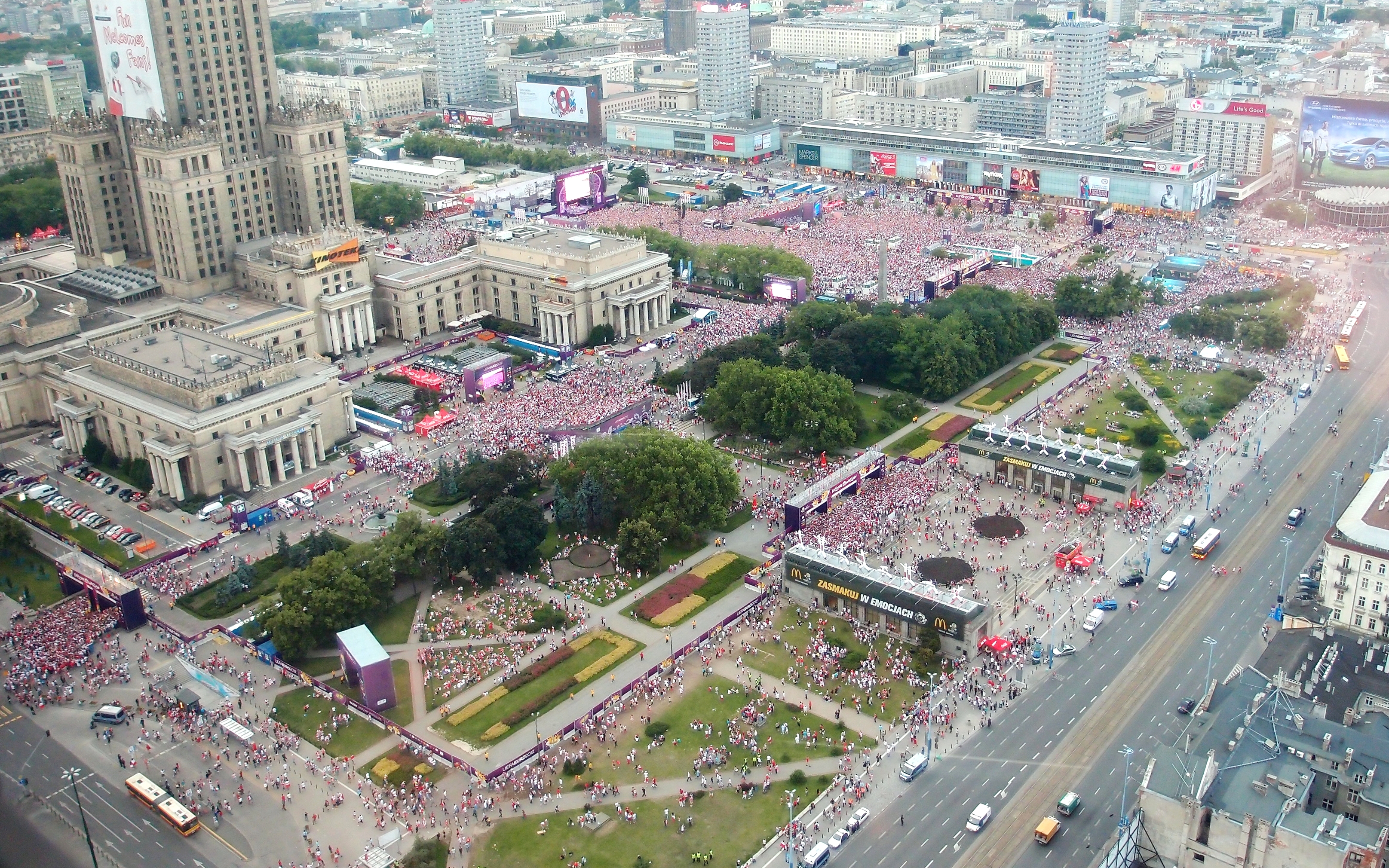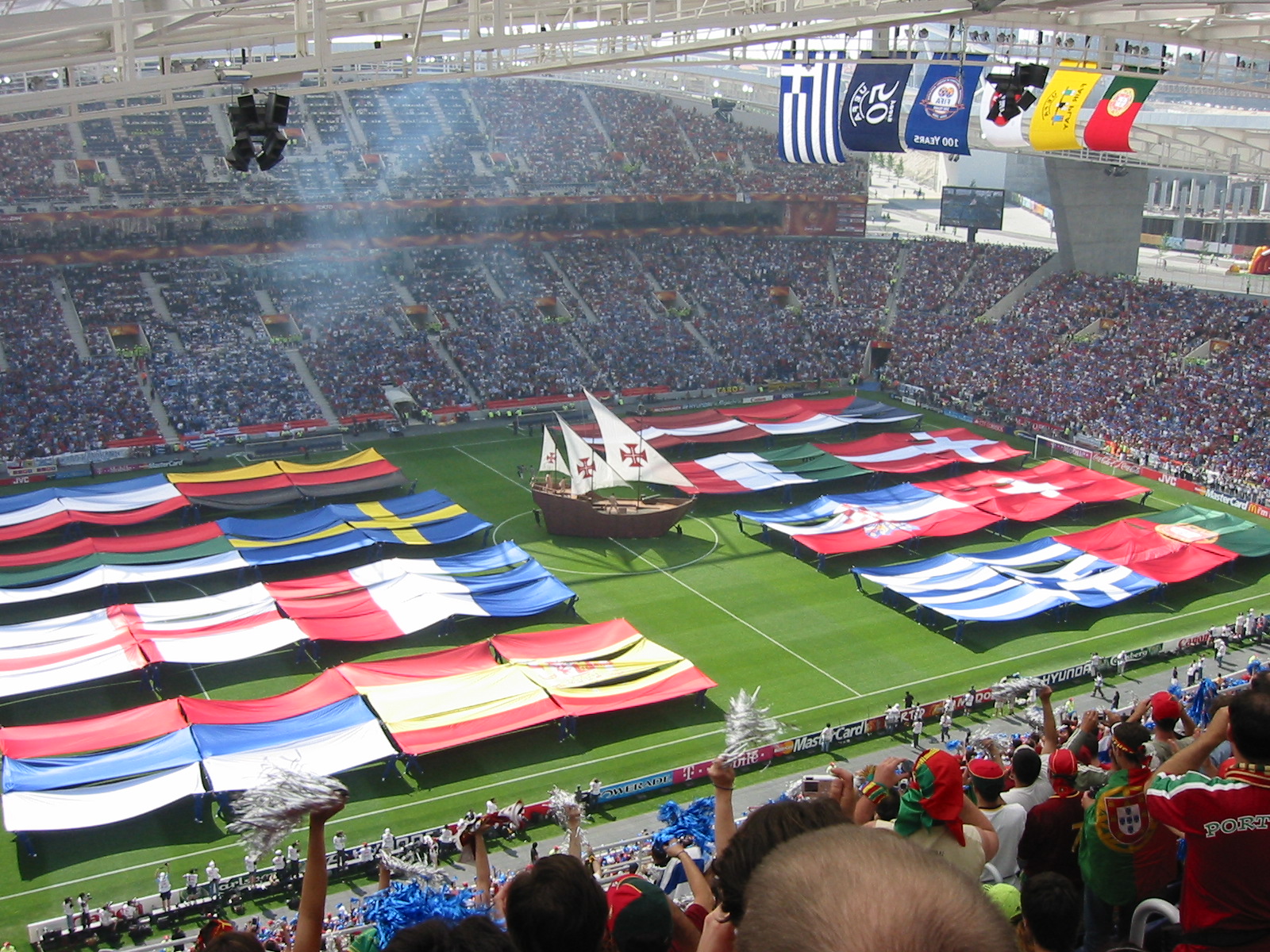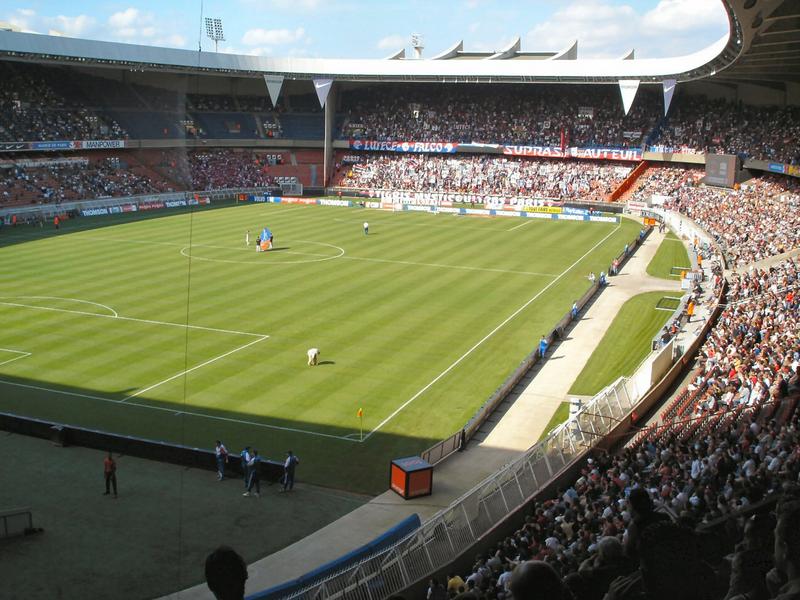|
UEFA Euro 2012 Group D
Group D of UEFA Euro 2012 began on 11 June 2012 and ended on 19 June 2012. The pool was made up of Ukraine, Sweden, France and England. The top two teams, England and France, progressed to the quarter-finals to play Italy and Spain respectively, while Ukraine and Sweden were eliminated from the tournament. On the second matchday, on 15 June, the match between Ukraine and France that began at 19:00 local time was interrupted by heavy rainfall and a thunderstorm. The conditions forced the referee to suspend the game during the fifth minute, and play was only resumed 58 minutes later. UEFA therefore delayed the match between Sweden and England to kick off 15 minutes later than originally scheduled, instead beginning at 22:00 local time, to avoid the matches overlapping. On the final matchday, on 19 June, the match between England and Ukraine featured a ghost goal by Marko Dević. In the second half, with Ukraine losing 1–0 to a Wayne Rooney goal, Dević's shot was hooked clear ... [...More Info...] [...Related Items...] OR: [Wikipedia] [Google] [Baidu] |
UEFA Euro 2012
The 2012 UEFA European Football Championship, commonly referred to as UEFA Euro 2012 or simply Euro 2012, was the 14th European Championship for men's national football teams organised by UEFA. The final tournament, held between 8 June and 1 July 2012, was co-hosted by Poland and Ukraine (both first time hosts), and was won by Spain, who beat Italy 4–0 in the final at the Olympic Stadium, Kyiv, Ukraine. Poland and Ukraine's bid was chosen by the UEFA Executive Committee on 18 April 2007. The two host teams qualified automatically while the remaining 14 finalists were decided through a qualifying competition, featuring 51 teams, from August 2010 to November 2011. This was the last European Championship to employ the 16-team finals format in use since 1996; from Euro 2016 onward, it was expanded to 24 finalists. Euro 2012 was played at eight venues, four in each host country. Five new stadiums were built for the tournament, and the hosts invested heavily in improving infra ... [...More Info...] [...Related Items...] OR: [Wikipedia] [Google] [Baidu] |
FIFA World Rankings
The FIFA Men's World Ranking is a ranking system for men's national teams in association football, led by Brazil . The teams of the men's member nations of FIFA, football's world governing body, are ranked based on their game results with the most successful teams being ranked highest. The rankings were introduced in December 1992, and eight teams (Argentina, Belgium, Brazil, France, Germany, Italy, the Netherlands and Spain) have held the top position, of which Brazil have spent the longest ranked first. The most recent FIFA rankings have been announced, and there have been some significant changes as teams. Argentina, the World Cup champions, moved up to second place in the FIFA rankings, following South American rivals Brazil, who are still in first place despite a disappointing World Cup. A points system is used, with points being awarded based on the results of all FIFA-recognised full international matches. The ranking system has been revamped on several occasions, gene ... [...More Info...] [...Related Items...] OR: [Wikipedia] [Google] [Baidu] |
Italy National Football Team
The Italy national football team ( it, Nazionale di calcio dell'Italia) has represented Italy in international football since its first match in 1910. The national team is controlled by the Italian Football Federation (FIGC), the governing body for football in Italy, which is a co-founder and member of UEFA. Italy's home matches are played at various stadiums throughout Italy, and its primary training ground and technical headquarters, Centro Tecnico Federale di Coverciano, is located in Florence. Italy are the reigning European champions, having won UEFA Euro 2020. Italy is one of the most successful national teams in the history of football and the World Cup, having won four titles (1934, 1938, 1982, 2006) and appearing in two other finals (1970, 1994), reaching a third place ( 1990) and a fourth place ( 1978). Italy also won two European Championships ( 1968, 2020), and appeared in two other finals of the tournament (2000, 2012). Italy's team also achieved a second p ... [...More Info...] [...Related Items...] OR: [Wikipedia] [Google] [Baidu] |
UEFA Euro 2012 Group C
Group C of UEFA Euro 2012 began on 10 June 2012 and ended on 18 June 2012. The pool consisted of Spain, Italy, Republic of Ireland and Croatia. The group was jokingly dubbed the "group of debt" by multiple media outlets, in reference to the European sovereign debt crisis facing some of its members. Spain and Italy progressed to the quarter-finals, while Croatia and Republic of Ireland were eliminated from the tournament. Republic of Ireland equalled the worst performance by a team in the group stage of the European Championships, finishing with no points and a goal difference of −8. Both Spain and Italy made it through the quarter-finals and semi-finals to reach the final for a second meeting in the tournament. In their final match, the Republic of Ireland wore black armbands to commemorate the 18th anniversary of the Loughinisland massacre. This was criticised by some unionists and members of the UVF. [...More Info...] [...Related Items...] OR: [Wikipedia] [Google] [Baidu] |
UEFA Euro 2012 Knockout Phase
The knockout phase of UEFA Euro 2012 began with the quarter-finals on 21 June 2012, and was completed on 1 July 2012 with the final at the Olympic Stadium in Kyiv, won by Spain 4–0 against Italy. After the completion of the group stage on 19 June 2012, eight teams qualified for the quarter-finals (two from each group), which are to be played from 21 to 24 June 2012. Host nations Poland and Ukraine failed to qualify for the quarter-finals, making it only the third time in European Championship history that the host nation(s) failed to make it out of the group stage; at Euro 2000, co-host Belgium were eliminated at the group stage, and at Euro 2008, co-hosts Austria and Switzerland also failed to qualify for the quarter-finals. Format Any game in the knockout stage that was undecided by the end of the regular 90 minutes was followed by 30 minutes of extra time (two 15-minute halves). If scores were still level after 30 minutes of extra time, there would be a penalty shootout (at lea ... [...More Info...] [...Related Items...] OR: [Wikipedia] [Google] [Baidu] |
UEFA Euro 1996
The 1996 UEFA European Football Championship, commonly referred to as Euro 96, was the 10th UEFA European Championship, a quadrennial football tournament contested by European nations and organised by UEFA. It took place in England from 8 to 30 June 1996. It was the first European Championship to feature 16 finalists, following UEFA's decision to expand the tournament from eight teams. Matches were staged in eight cities and, although not all games were sold out, the tournament holds the European Championship's second-highest aggregate attendance (1,276,000) and average per game (41,158) for the 16-team format, surpassed only in 2012. The tournament was the first European Championship where three points were awarded for a win during the qualification and finals group stages, as opposed to the old system of two points for a win, reflecting the growing use of this system in domestic leagues throughout the world during the previous decade. Germany won the tournament, beating the ... [...More Info...] [...Related Items...] OR: [Wikipedia] [Google] [Baidu] |
UEFA Euro 1968
The 1968 UEFA European Football Championship final tournament was held in Italy. This was the third UEFA European Championship, an event held every four years and organised by UEFA. The final tournament took place between 5 and 10 June 1968. It was in this year that the tournament changed its name from the "European Nations' Cup" to the "European Championship". There were also some changes in the tournament's qualifying structure, with the two-legged home-and-away knock-out stage being replaced by a group phase. Four countries played in the final tournament, which consisted of the semi-finals, a third place play-off, and the final. The host nation for the finals was selected from the four qualified nations. Qualification The qualification competition was played in two stages: a group stage (taking place from 1966 until 1968) and the quarter-finals (played in 1968). There were eight qualifying groups of four teams each with the exception of group 4, which only had three. The m ... [...More Info...] [...Related Items...] OR: [Wikipedia] [Google] [Baidu] |
UEFA Euro 2004
The 2004 UEFA European Football Championship, commonly referred to as Euro 2004, was the 12th edition of the UEFA European Championship, a quadrennial association football, football competition contested by the List of men's national association football teams#UEFA (Europe), men's national teams of UEFA member associations. The final tournament was hosted for the first time in Portugal, from 12 June to 4 July 2004. A total of 31 matches were played in ten venues across eight cities – Aveiro, Portugal, Aveiro, Braga, Coimbra, Guimarães, Faro, Portugal, Faro/Loulé, Leiria, Lisbon, and Porto. As in UEFA Euro 1996, 1996 and UEFA Euro 2000, 2000, the final tournament was contested by 16 teams: the hosts plus the 15 teams that came through the UEFA Euro 2004 qualifying, qualifying tournament, which began in September 2002. Latvia national football team, Latvia secured their first participation in a major tournament after overcoming Turkey national football team, Turkey in the UEFA ... [...More Info...] [...Related Items...] OR: [Wikipedia] [Google] [Baidu] |
UEFA Euro 2012 Qualifying Group G
This page shows the standings and results for Group G of the UEFA Euro 2012 qualifying tournament. Standings Matches A meeting was held in Zürich, Switzerland, on 15 March to determine the Group G fixture schedule. After that meeting proved inconclusive, the fixture list was determined by a random draw at the XXXIV Ordinary UEFA Congress in Tel Aviv, Israel Israel (; he, יִשְׂרָאֵל, ; ar, إِسْرَائِيل, ), officially the State of Israel ( he, מְדִינַת יִשְׂרָאֵל, label=none, translit=Medīnat Yīsrāʾēl; ), is a country in Western Asia. It is situated ..., on 25 March 2010. ---- ---- ---- ---- ---- ---- ---- ---- ---- Goalscorers Discipline References {{DEFAULTSORT:Euro Group G 2010–11 in English football qual 2010–11 in Welsh football 2011–12 in Welsh football 2010–11 in Bulgarian football 2011–12 in Bulgarian football 2010–11 in Swiss football 2011–12 in Swis ... [...More Info...] [...Related Items...] OR: [Wikipedia] [Google] [Baidu] |
UEFA Euro 2000
The 2000 UEFA European Football Championship, also known as Euro 2000, was the 11th UEFA European Championship, a football tournament held every four years and organised by UEFA, the sport's governing body in Europe. The finals tournament was played between 10 June and 2 July 2000, and co-hosted by Belgium and the Netherlands, the first time the tournament had been held in more than one nation. Spain and Austria also bid to host the event. The finals tournament was contested by 16 nations; with the exception of the hosts, Belgium and the Netherlands, the finalists had to go through a qualifying tournament to reach the final stage. France won the tournament by defeating Italy 2–1 in the final, via a golden goal. The finals saw the first major UEFA competition contested in the King Baudouin Stadium (formerly the Heysel Stadium) since the events of the 1985 European Cup Final and the Heysel Stadium disaster, with the opening game being played in the rebuilt stadium. A high-s ... [...More Info...] [...Related Items...] OR: [Wikipedia] [Google] [Baidu] |
UEFA Euro 1984
The 1984 UEFA European Football Championship final tournament was held in France from 12 to 27 June 1984. It was the seventh UEFA European Championship, a competition held every four years and endorsed by UEFA. At the time, only eight countries took part in the final stage of the tournament, seven of which had to come through the qualifying stage. France qualified automatically as hosts of the event; in the tournament led by Michel Platini, who scored nine goals in France's five matches, ''Les Bleus'' won the championship – their first major international title. Bid process The hosting of the event was contested by bids from France and West Germany. The French bid was unanimously selected by the UEFA Executive Committee at a meeting on 10 December 1981. Tournament summary Group matches The opening game of tournament featured France and Denmark. The sides played out a very close encounter until Michel Platini's goal on 78 minutes gave the hosts a 1–0 victory. The opening ga ... [...More Info...] [...Related Items...] OR: [Wikipedia] [Google] [Baidu] |
UEFA Euro 2012 Qualifying Group D
This page shows the standings and results for Group D of the UEFA Euro 2012 qualifying tournament. Standings Matches Group D fixtures were negotiated between the participants at a meeting in Luxembourg on 19 February 2010. ---- ---- ---- ---- ---- ---- ---- ---- ---- ---- ---- Goalscorers Discipline References {{DEFAULTSORT:EuroGroup D Group D may refer to:
* FIA Group D - International Formula racing cars:
** Formula Two
** Formula Three
** Formula 3000
* One of six ...
[...More Info...] [...Related Items...] OR: [Wikipedia] [Google] [Baidu] |





